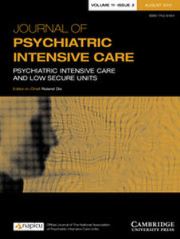Article contents
Emergency psychiatric assessments: effects of accessing clinical records on outcome
Published online by Cambridge University Press: 10 April 2007
Abstract
Aims and Methods: A retrospective cohort was identified to examine the impact of information availability on outcome of emergency psychiatric assessment.
Results: Of 144 assessments undertaken during a 2-month period, 110 (76%) involved patients already known to regional psychiatric services, with records held on-site and remote from acute services at the District General Hospital site. 18 (16%) on-site clinical records were accessed during emergency assessments, only 3 (3%) of which were accessed during out-of-hours. No off-site records were accessed. Admission rates were low, with only 22 (15%) of assessments leading to admission and 63 (44%) resulting in onward referral to other services. Outcome for in- and out-of-hours assessments did not differ.
Conclusion: Our data failed to show a significant effect of accessing clinical records on admission rate.
- Type
- Research Article
- Information
- Copyright
- Copyright © NAPICU 2007
- 1
- Cited by


